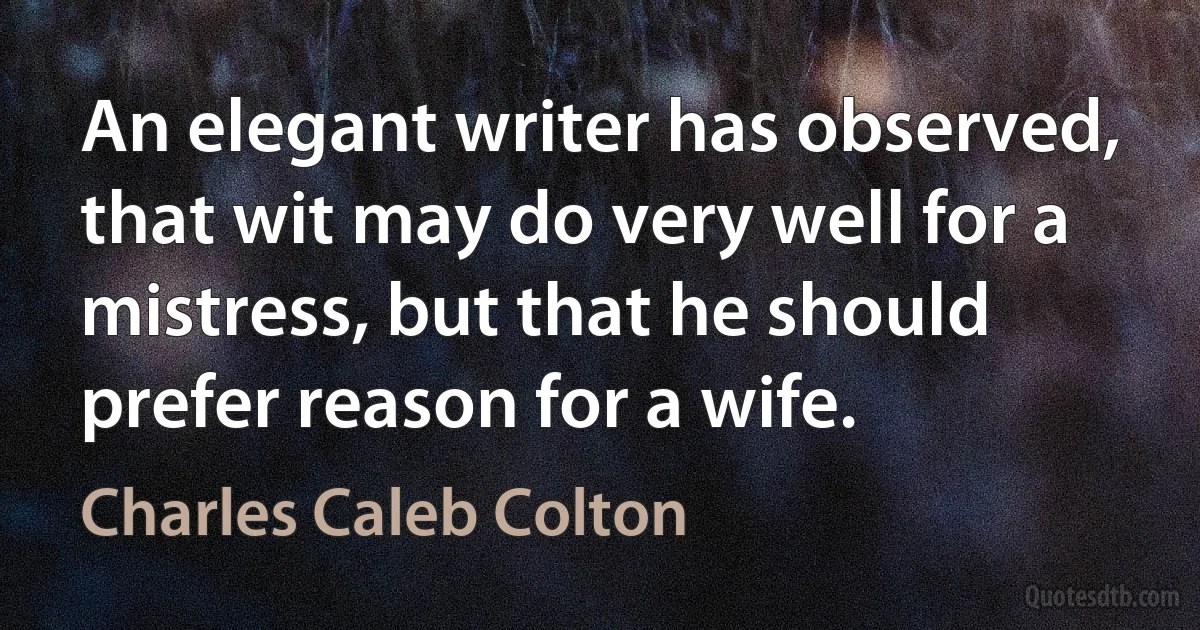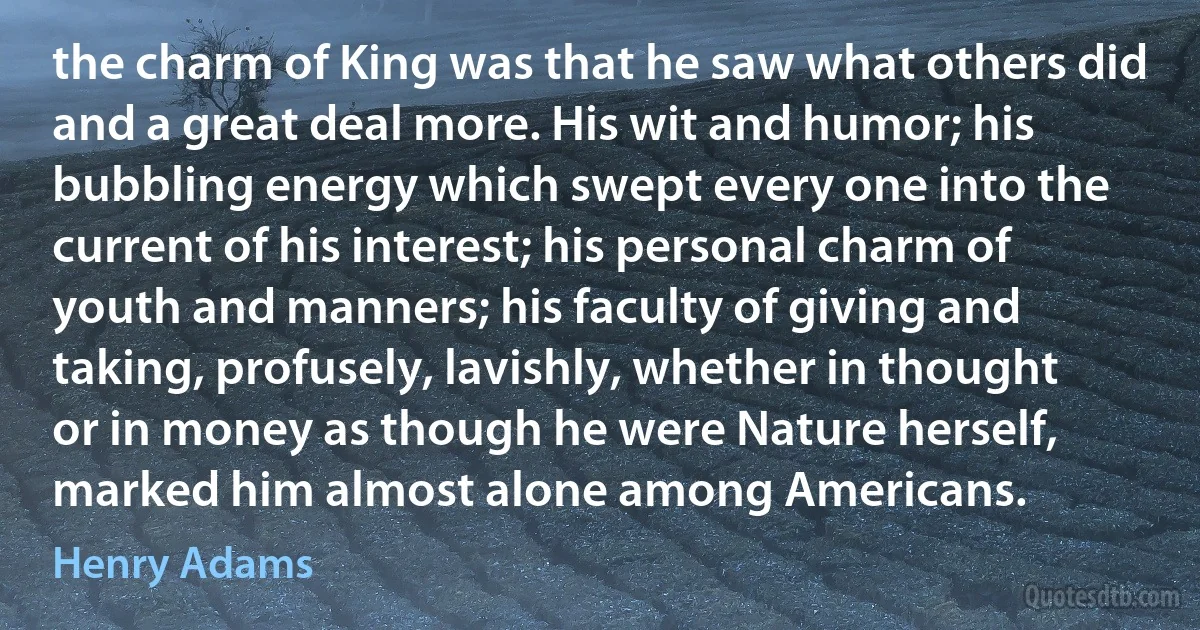Wit Quotes - page 12
I never had a strategy in my dealing with other humans! I've always been very passive socially. I went along with their agenda. I had none of my own! Left to my own devices I stayed in my room or wandered aimlessly in the streets, fantasizing about bizarre things I yearned to do to big ladies, or filled with self-pity and resentment. I was helpless in the presence of other people! My main concern was to make them like me by being as agreeable as possible, and secondly to impress them with my brilliance, my sharp wit, my originality, and my fundamental saintliness. Over time, and after years-decades-of diligent practice, I became very good at this cute little performance of mine. But this performance was improvised in the moment, catered to suit whoever I happened to be with. There was no strategy. It was always an effort. Only in solitude was I completely relaxed. Funny thing...

Robert Crumb
The American is marked, in fact, by precisely the habits of mind and act that one would look for in a man insatiably ambitious and yet incurably fearful, to wit, the habits, on the one hand, of unpleasant assertiveness, of somewhat boisterous braggardism, of incessant pushing, and, on the other hand, of conformity, caution and subservience. He is forever talking of his rights as if he stood ready to defend them with his last drop of blood, and forever yielding them up at the first demand.

H. L. Mencken
Though the theology of Christianity had thus sunk to the lowly estate of a mere delusion of the rabble, propagated on that level by the ancient caste of sacerdotal parasites, the ethics of Christianity continued to enjoy the utmost acceptance, and perhaps even more acceptance than ever before. It seemed to be generally felt, in fact, that they simply must be saved from the wreck-that the world would vanish into chaos if they went the way of the revelations supporting them. In this fear a great many judicious men joined, and so there arose what was, in essence, an absolutely new Christian cult-a cult, to wit, purged of all the supernaturalism superimposed upon the older cult by generations of theologians, and harking back to what was conceived to be the pure ethical doctrine of Jesus.

H. L. Mencken
We wish in our country that morality may be substituted for egotism, probity for false honour, principles for usages, duties for good manners, the empire of reason for the tyranny of fashion, a contempt of vice for a contempt of misfortune, pride for insolence, magnanimity for vanity, the love of glory for the love of money, good people for good company, merit for intrigue, genius for wit, truth for tinsel show, the attractions of happiness for the ennui of sensuality, the grandeur of man for the littleness of the great, a people magnanimous, powerful, happy, for a people amiable, frivolous and miserable; in a word, all the virtues and miracles of a Republic instead of all the vices and absurdities of a Monarchy.

Maximilien Robespierre
Much of his work he did while confined to his bed. He was always an invalid, always obliged to take great care of himself, living constantly with death just before him, never idle a moment for fear his work would not be done. Probably no man ever lived who assailed the Church and the State with the same wit and keenness that was always at Voltaire's command; and yet in spite of this he managed to live comfortably, accumulate riches and die in peace.

Clarence Darrow
For a hundred and fifty years the Virgin and Queens ruled French taste and thought so successfully that the French man has never yet quite decided whether to be more proud or ashamed of it. Life has ever since seemed a little flat to him, and art a little cheap. He saw that the woman, in elevating herself, had made him appear ridiculous, and he tried to retaliate with a wit not always sparkling, and too often at his own expense.

Henry Adams
Monckton Milnes was a social power in London, and of course he himself affected social eccentricity, challenging ridicule with the indifference of one who knew himself to be the first wit in London, and a maker of men - of a great many men. A word from him went far. An invitation to his breakfast-table went farther. Behind his almost Falstaffian mask and laugh of Silenus, he carried a fine, broad, and high intelligence which no one questioned. As a young man he had written verses, which some readers thought poetry, and which were certainly not altogether prose. Later, in Parliament he made speeches, chiefly criticised as too good for the place and too high for the audience. Socially, he was one of two or three men who went everywhere, knew everybody, talked of everything.

Henry Adams
No one cared enough to criticise, except himself who soon began to suffer from reaching his own limits. He found that he could not be this - or that - or the other; always precisely the things he wanted to be. He had not wit or scope or force. Judges always ranked him beneath a rival, if he had any; and he believed the judges were right. His work seemed to him thin, commonplace, feeble. At times he felt his own weakness so fatally that he could not go on; when he had nothing to say, he could not say it, and he found that he had very little to say at best.

Henry Adams
I am not blind to the worth of the wonderful gift of "LEAVES OF GRASS." I find it the most extraordinary piece of wit and wisdom that America has yet contributed. I am very happy in reading it, as great power makes us happy. It meets the demand I am always making of what seemed the sterile and stingy nature, as if too much handiwork, or too much lymph in the temperament, were making our western wits fat and mean.
I give you joy of your free and brave thought. I have great joy in it. I find incomparable things said incomparably well, as they must be. I find the courage of treatment which so delights us, and which large perception only can inspire.
I greet you at the beginning of a great career, which yet must have had a long foreground somewhere, for such a start. I rubbed my eyes a little, to see if this sunbeam were no illusion; but the solid sense of the book is a sober certainty. It has the best merits, namely, of fortifying and encouraging...

Ralph Waldo Emerson
It is not to be supposed that she was, or that any one, at the age at which I first saw her, could be, all that she afterwards became. Least of all could this be true of her, with whom self-improvement, progress in the highest and in all senses, was a law of her nature; a necessity equally from the ardour with which she sought it, and from the spontaneous tendency of faculties which could not receive an impression or an experience without making it the source or the occasion of an accession of wisdom. Up to the time when I first saw her, her rich and powerful nature had chiefly unfolded itself according to the received type of feminine genius. To her outer circle she was a beauty and a wit, with an air of natural distinction, felt by all who approached her: to the inner, a woman of deep and strong feeling, of penetrating and intuitive intelligence, and of an eminently meditative and poetic nature.

John Stuart Mill
Scilla, a Sicilian painter, published in l670, a work on the fossils of Calabria, illustrated by good engravings. This was written in Latin, with great spirit and elegance, and it proves the continued ascendency of dogmas often refuted; for we find the wit and eloquence of the author chiefly directed against the obstinate incredulity of naturalists, as to the organic nature of fossil shells.

Charles Lyell



